Albanians, so close...so far
Port of Bari . August 6th 1991. The ship " Vlora " reaches the
apulian coast with a cargo of approximately 20,000 Albanians, men, women
and children terribly crammed . This disembarkation of immigrants, the more imposing never happened in Italy, is
the consequence of the collapsing of the communist regimes in the East of
Europe. The apocalyptic scenes of the landing ,the frightened gaze of the
children, the marked face of their parents, certainly represent a slap in the face
to human dignity but also a warning , a " j'accuse "
to the indifference of the rich and democratic western states .
The sad memory of that boat overwhelmed with destinies, desperation and
hopes, will remain for a long time impressed in the mind of italian people...
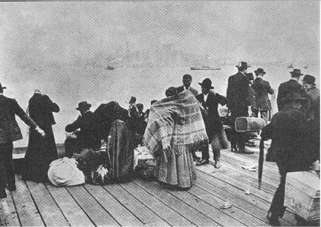
U. S. A. : Italian Emigrants waiting for the ferry bound for Manhattan (Ellis Island, 30/10/1912)
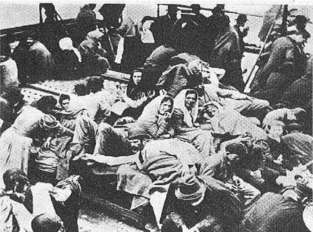
Italian immigrants during a oceanic crossing. In the post-war period our emigrants, faced long and exhausting travels toward the United States, Australia, Canada or Latin America , someone with a cardboard bag , somebody else without even a bag , but all of them shared the same dream...
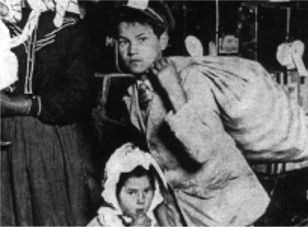
Picture of italian emigrants
The movie directed by Gianni Amelio, " LAMERICA ", underlines that Italy is for the Albanians the Promised Land, a mythical Eldorado, a sort of America, the dream of a wealthy or at least of a decorous life. In the initial scene of the movie some refugees cry " Italia, Italia... ti je bota ", literally, " Italy... you are the world ".
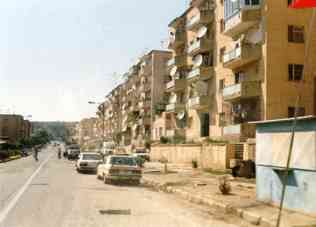
Parabolic reflector antennas ...a glance to the world
Who are the Albanians?
Although the frequent and repeated disembarks on italian coasts , rarely someone asks himself who are these persons, this " boat people "
in continuous movement who risks the life crossing the Adriatic, often in proibitive conditions. Who are the Albanians?
Reading the titles of the daily newspapers ... it would be easy to
answer: hull-drivers , drug pedlars, murders, housebreakers , brutal
criminals, prostitutes. But is it this, the true nature of the "people of the eagles"?
Of course, not. Without questioning the importance of journalistic report,
often the instrumentalization of some episodes favors an easy "witch hunt" towards the foreign people. Little space is instead dedicated
to the different cultures present in our country.
The discriminations, the prejudgments and consequently the racial hate are
rooted in the " ignorance ", or it is better to call it " not acquaintance ".
The popularization is the best weapon against every intolerance. So I would make known some aspects of the Albanian culture, with short
panoramic on literature, history, religion, language.
If Orazio remains bewitched by the beauty of the " gardens of Vlora
" to which he dedicates some lines of his poetries, many intellectuals
not only in Italy have shown interest for the eroic deeds
of Skanderbeg (translated in many languages)and its people.
Also Lavardin, Duponcet, Pierre de Ronsard and Alphonse de Lamartine dedicated some lines to his story. The English poet Lord Byron was enraptured by the
charm of rural Albania that he visited in 1800; Shakespeare set its "Twelfth Night" in Illyria, the ancient name of Albania; in Mozart's "Cosě Fan Tutte" the main male characters (Ferrando
and Guglielmo) are described as two " Albanian nobles ".
The beauty of the mounts, the limpid streams and the valleys of this country enraptured also the Croatian intellectual Milan von Sufflay,
that in a
book of 1913, called the land of the eagles " regio mirabilissima " ( wonderful region ).
Few people know that the Albanian language is among the most ancient languages with Indo-European origin; that the Byzantine emperor
Anastasius (491-518 TO) was an Albanian of Durres; that, as it is certificated by the studies of Sir William Woodthorpe Tarn of the
British Academy, Alexander the Great was for paternal and perhaps maternal way of Illyrian origin and that therefore in its veins slid Albanian
blood; that Karl Von Ghega, the constructor of the famous Semmering railroad in Austria, become then a model for all Europe, was of
Albanian origin, like Antonio Gramsci, one of the most eminent figures
of Italian politic, or that Mother Teresa belonged to the Albanian community of Skopje, in Macedonia. Aleksander Moisiu,
recognized from the international critic as one of the greatest actors of the theatrical scene of the years twenty, remembered for its interpretations of
Edipo, Hamlet, Faust, " The Living Body " of Tolstoj or " The Doctor' s Dilemma " of George Bernard Shaw, was an Albanian
emigrated first in Italy and then in Austria. Recently, the Albanian soprano Inva Mula
stand out in the world-wide lyric panorama
, winning the well-known " Plácido Domingo Competition " at the Opera Garnier of Paris,
; she had also interpreted in many theatres of Europe, the role of Norina
in " Don Pasquale", of Susanna in " The Wedding of Figaro ", of Mosetta in
the" Bohčme ", of Gilda in the " Rigoletto ", of Nanetta
in " Falstaff " and of Violetta in the " Traviata " . Who remembers John Belushi, the American actor who
played with Dan
Akroyd in the well-known movie " The Blues Brothers " , perhaps doesn't know that he is one of the two sons (its brother
James is too a skilful actor ) of an Albanian emigrated in the United States in 1934.
The old fans of italian soccer will probably remember some Albanian protagonists in the Italian championship
as Naim Kryeziu, Loro Borici
and above all Riza Lushta,the albanian player of Kosovo, that in 1940 played in Bari Football Team (that acquired it from the Sportul Tirana),
Juventus, Naples and Alessandria, enrapturing the platees with its agility and its
elevated scoring ability , (he still is among the more prolific scorers of Italian "Serie A" ). But Lushta was
also appreciated for his loyalty and his simplicity . The son of a "poor soccer"
, so far from today's billionaire football, the king of the Albanian football died in poverty
, in a popular quarter of Turin, forgotten by the world of sport to which he had dedicated his own life.
During his funeral
were present his close friends , some former companions, but above all
many of his old italian fans.
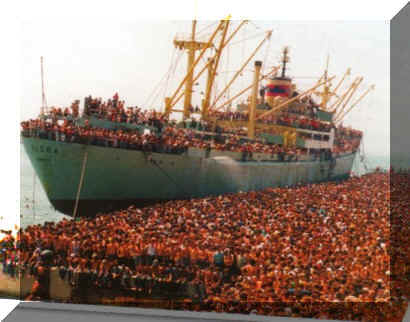
Picture
of the Landing
Unprepared to this exodus of Biblical dimensions, the local authorities use the stadium " Delle Vittorie " for the first aids. The gaze of many Italians dwells upon the pitiable economic conditions of post-Communist Albania and many people see in the intense and expressive eyes of the refugees, the immigrants' destiny of their own grandfathers.
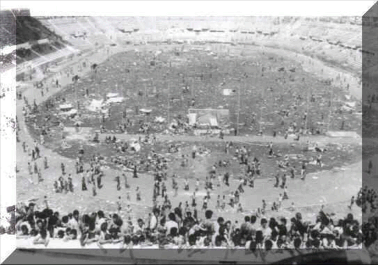
Bari, Stadium "Della Vittoria"
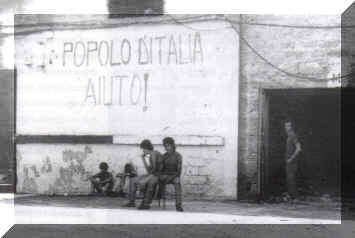
Bari, Stadio Della Vittoria
Written on the walls of the old stadium or cried by the immigrants, the message is clear and unequivocal: "HELP!".
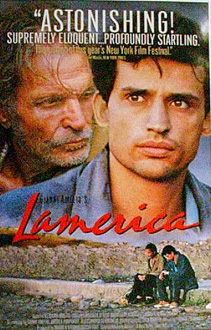
LAMERICA
of GIANNI AMELIO
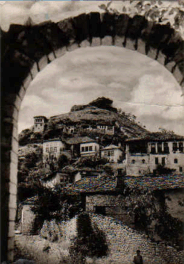
Argirocastro, South Albania
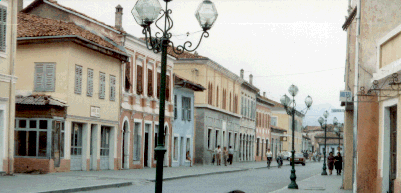
Shkodre, north Albania
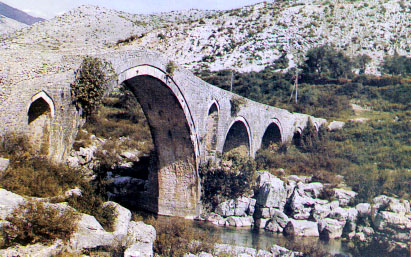
Mesi Bridge
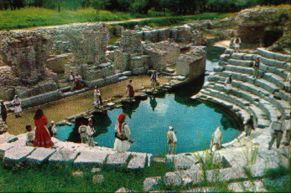
Butrinte - Amphitheatre
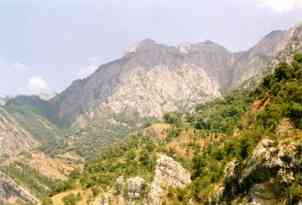
Albanian Mountains
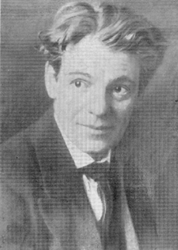
Aleksander Moisiu

Inva Mula
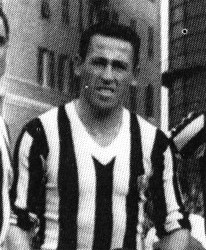
Riza Lushta - Juventus
